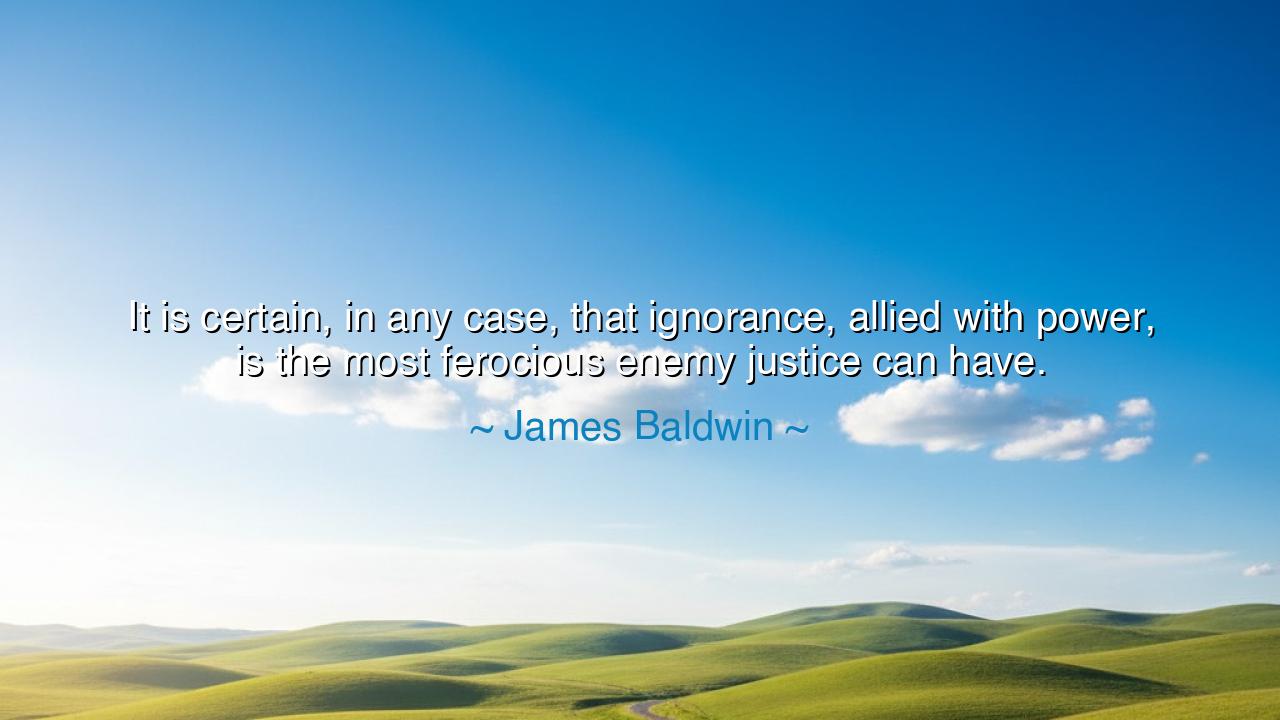
It is certain, in any case, that ignorance, allied with power
It is certain, in any case, that ignorance, allied with power, is the most ferocious enemy justice can have.






James Baldwin, prophet of truth in a time of turmoil, warned with searing clarity: “It is certain, in any case, that ignorance, allied with power, is the most ferocious enemy justice can have.” In these words he unmasks the most dangerous of alliances: when power, which can shape nations, is joined not with wisdom but with ignorance, which blinds the soul. For strength without knowledge, might without understanding, becomes not a guardian but a tyrant, crushing the weak beneath its weight.
Ignorance alone is dangerous, but it is limited; the unknowing man harms chiefly himself. Power alone can be dangerous, but in the hands of the wise it may be tempered and just. But when ignorance and power are fused, the result is monstrous: decisions made in blindness yet enforced with force, cruelty committed with the confidence of righteousness, injustice defended as law. This is the enemy Baldwin warns against, one more dreadful than any single oppressor, for it is both blind and strong.
History shouts its warnings. In the days of the Spanish Inquisition, power sat enthroned, but it was ignorance—fear of knowledge, fear of freedom—that guided its hand. Books were burned, voices silenced, men and women tortured in the name of protecting truth. Justice was not only denied; it was mocked. And again, in the age of slavery in America, laws built on ignorance—the belief that one race was less than human—were upheld by the full power of state and nation. Against such an alliance, justice groaned in chains.
Baldwin himself, who witnessed the cruelties of segregation and the blindness of those who defended it, knew this enemy intimately. He saw how power, allied with ignorance of another’s humanity, birthed oppression. Yet he also knew that truth and courage could break this alliance. His words are both warning and weapon, teaching us to resist with knowledge, with love, with justice sharpened against the dull edge of ignorance.
O children of tomorrow, mark Baldwin’s wisdom: fear not the ignorant man alone, nor the powerful man alone, but tremble when they stand together. For in that union lies the fiercest foe of justice. Yet also remember: every alliance may be broken. Where light enters, ignorance flees; where truth speaks, power trembles. Let knowledge, compassion, and courage be your weapons, and you shall stand against this ferocious enemy until justice prevails.






NBtruong thi ngoc bich
This quote highlights a profound ethical dilemma: how can justice survive when decision-makers lack understanding? It prompts me to question the responsibility of both leaders and citizens. Should there be a moral obligation for those in power to continually educate themselves, and for society to hold them accountable when ignorance leads to injustice? I’d like a perspective on balancing freedom in leadership selection with the need for competence and awareness to protect societal fairness.
UGUser Google
I feel a mix of apprehension and reflection reading this. Ignorance in power is terrifying because it often operates without accountability, creating real-world harm. It makes me think about social and legal systems—are they designed to counteract the destructive influence of uninformed authorities? I’d like to explore methods that societies use to safeguard justice, such as transparency, oversight, and public participation. Could modern technology help, or does it also risk spreading ignorance faster?
LSLucie Stclair
This perspective makes me question the nature of power itself. Are there systems that inherently amplify ignorance, or is it more about the character of those who rise to leadership? I’m concerned about how contemporary politics and corporate hierarchies may reflect this dynamic. Is it enough to promote education, or do we need structural checks to prevent unqualified individuals from making decisions that impact society at large? It seems like both personal virtue and systemic design are crucial.
VDVy Van Duong
Reading this evokes a sense of frustration and urgency. Ignorance combined with authority can have catastrophic consequences, from social injustice to systemic corruption. I’m curious about historical examples where this dynamic played out prominently. Can public awareness and civic engagement act as a counterbalance, or are there inherent limitations? Additionally, how do we ensure that those in power remain both knowledgeable and ethically grounded in order to protect justice?
BDBao Dinh
This quote makes me think deeply about the dangers of uninformed leadership. How often do we see individuals in positions of power making decisions that harm society simply because they lack understanding or refuse to educate themselves? It raises questions about accountability—should there be mechanisms to prevent those who are ignorant from wielding influence over justice and policy? I also wonder how education and access to diverse perspectives could mitigate this threat effectively.